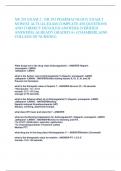NR 293 EXAM 2 / NR 293 PHARMACOLOGY EXAM 2
NEWEST ACTUAL EXAM COMPLETE 450 QUESTIONS
AND CORRECT DETAILED ANSWERS (VERIFIED
ANSWERS) |ALREADY GRADED A+ (CHAMBERLAINE
COLLEGE OF NURSING)
What drugs are in the drug class Anticoagulants I - ANSWER-Heparin
-enoxaparin -LMWH
-dalteparin -LMWH
what is the Action/ use of Anticoagulants? I (Heparin, enoxaparin -LMWH
,dalteparin -LMWH) - ANSWERInhibit clotting factors II, IX, X, XI, and XII
Prevent clot formation
what is the therapetic value of heparin ? - ANSWER•Normal: 25 - 35 seconds
•Therapeutic: 1.5 - 2.5 X
normal= 37.5 - 87.5 sec
average of 70 seconds.
what is the Adverse affect of of Anticoagulants? I (Heparin, enoxaparin -LMWH
,dalteparin -LMWH) - ANSWERBleeding
Heparin-induced thrombocytopenia (HIT)
Nausea, vomiting, abdominal cramps.
what does HIT mean and stand for? - ANSWER
whta are the Nursing Implaication for Anticoagulants? I (Heparin, enoxaparin -LMWH
,dalteparin -LMWH) - ANSWER•Monitor for bleeding and HIT,
•Tx of HIT: Antithrobin: lepirudin, agathroban
•Tx of bleeding/antidote: Protamine sulfate
Monitor PTT
what drug are in the drug class Anticoagulants 11 - ANSWERWarfarin (Coumadin
what is the therapeutic value for warfain - ANSWER•PT: 1.5-2 X
normal= 13.5 - 26 seconds
,what is the Action/ use of the Drug Anticoagulants II (warfain) - ANSWERInhibits
production of vitamin K-dependent clotting factors II, VII, IX, and X,
-Prevent clot formation
what is the Adverse effect of Anticoagulants II (warfain) - ANSWERBleeding
what are the nursing implications of Anticoagulants II (warfain) - ANSWER•Antidote
vitamin K
•Monitor PT, and INR.
Diet to Restrict Foods with to much Vitamin K
what drugs are in this drug class Anticoagulants III - ANSWERLepirudin, argatroban
What is the action / use of the drug Anticoagulants III, Lepirudin, argatroban. -
ANSWERAntithrombin. Inhibits CF II
what is the adverse affect of the drug Anticoagulants III, Lepirudin, argatroban. -
ANSWERBleeding
what is the nursing implaction for the drug Anticoagulants III, Lepirudin, argatroban. -
ANSWER•Tx of HIT: Antithrobin: lepirudin, agathroban
what drugs are in the drug class Anticoagulants IIII - ANSWERfondaparinux (Arixtra)
rivaroxaban (Xarelto)
apixaban (Eliquis)
what is the Action/drug of the Anticoagulants IIII (fondaparinux (Arixtra)
rivaroxaban (Xarelto), apixaban (Eliquis)) - ANSWERfactor Xa inhibitors
what is the Adverse effect of Anticoagulants IIII (fondaparinux (Arixtra)
rivaroxaban (Xarelto), apixaban (Eliquis)) - ANSWERDizziness, bleeding
(See specifics)
what drug is in the drug class Antiplatelet ? - ANSWERPentophylline
what is action/ use of the drug Antiplatelet (Pentophylline) - ANSWERDecrease blood
viscosity
what is the adverse effect of Antiplatelet (Pentophylline) - ANSWERbleeding
what drug is in the drug class Thrombolytic - ANSWER-streptokinase
-alteplase (Activase, Cathflo Activase)
-reteplase (Retavase)
what is the action / use of Thrombolytic - ANSWERbreak down, or lyse preformed clots
what is the adverse effects of Thrombolytic - ANSWER-Bleeding
-Nausea,
-vomiting,
-hypotension
-Cardiac dysrhythmias
,what is the nursing implacation for Thrombolytic - ANSWERAntidote: Aminocaproic acid
" it forms clots"
What is the treatment of hemophilia - ANSWERAminocaproic acid
Identify herbal remedies that may interact with anticoagulants to cause bleeding -
ANSWERgarlic, gingers, Gingko, st john's wort, Dong Quai, fever few, capsicum pepper,
What is the advantage of administering enoxaparin over unfractionated heparin? -
ANSWERLess risk for bleeding and HIT. Less need for lab monitoring.
what are the Signs of bleeding - ANSWERBruising, petechiae
low BP,
anemia,
pallor,
ecchymoses,
changes in LOC (from cerebral bleeding),
melena,
hematuria,
epistasis,
GI ulcer(aspirin).
what drug is in the drug class Alpha2 receptor agonists (central) - ANSWERClonidine
methyldopa
what is the Action/Use of the drug Alpha2 receptor agonists (central) - ANSWERDecrease
norepinephrine production, decrease blood pressure
what are the adverse effects Alpha2 receptor agonists (central) (Clonidine,
methyldopa) - ANSWERorthostatic hypotension, fatigue, and dizziness
what nursing implication is Alpha2 receptor agonists (central) (Clonidine,
methyldopa) used for - ANSWER
what drug is in the drug class Alpha1 receptor blockers (peripheral) -
ANSWERDoxazosin,
prazosin
terazosin
what is the Action/Use of the drug Alpha1 receptor blockers (peripheral) -
ANSWERReduces peripheral vascular resistance and BP by dilating both arterial and
venous blood vessels
what is the Adverse effects of Alpha1 receptor blockers (peripheral) -
ANSWERTachycardia, dizziness, N/V/D, constipation, dry mouth, HA, chest pain,
depression
what condition is Alpha1 receptor blockers (peripheral) also used for ? - ANSWERBPH
what is the nursing implication for Alpha1 receptor blockers (peripheral) - ANSWER
, what drug is in the drug class Beta receptor blockers (peripheral) - ANSWERPropranolol
metoprolol
atenolol
what is the Action/Use of the drug Beta receptor blockers (peripheral) - ANSWERCause
reduced secretion of renin,
what is the Adverse effects of Beta receptor blockers (peripheral) - ANSWERBradycardia
Drowsiness, Impotence, Constipation, dry mouth, Edema
hypoglycemia
hypotension
what is the nursing implication for Beta receptor blockers (peripheral) - ANSWER
what drug is in the drug class Combination alpha1 and beta receptor blockers -
ANSWERLabetalol
carvedilol
what is the Action/Use of the drug Combination alpha1 and beta receptor blockers -
ANSWERUses: hypertension and HF
what is the Adverse effects of Combination alpha1 and beta receptor blockers -
ANSWERBradycardia
Drowsiness, Impotence, Constipation, dry mouth, Edema
hypoglycemia
hypotension
what is the nursing implications of Combination alpha1 and beta receptor blockers -
ANSWER
what drug is in the drug class Angiotensin-Converting Enzyme (ACE) Inhibitors -
ANSWERcaptopril (Capoten)
enalapril (Vasotec)
fosinopril (Monopril)
lisinopril (Prinivil)
what is the Action/Use of the drug Angiotensin-Converting Enzyme (ACE) Inhibitors -
ANSWERInhibit ACE, decrease angiotensin II, and decrease BP
what is the Adverse effects of Angiotensin-Converting Enzyme (ACE) Inhibitors -
ANSWERFatigue, Dizziness Headache
Mood changes
Impaired taste
hyperkalemia
Dry, nonproductive cough, which reverses when therapy is stopped
Angioedema: rare
what is the nursing implications of Angiotensin-Converting Enzyme (ACE) Inhibitors -
ANSWER




